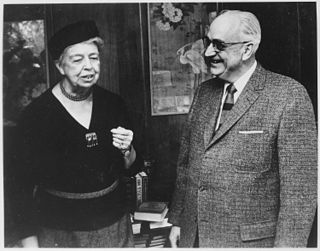
Karl Augustus Menninger was an American psychiatrist and a member of the Menninger family of psychiatrists who founded the Menninger Foundation and the Menninger Clinic in Topeka, Kansas.
The Menninger Foundation was founded in 1919 by the Menninger family in Topeka, Kansas. The Menninger Foundation, known locally as Menninger's, consists of a clinic, a sanatorium, and a school of psychiatry, all of which bear the Menninger name. Menninger's consisted of a campus at 5800 S.W. 6th Avenue in Topeka, Kansas which included a pool as well as the other aforementioned buildings. In 2003, the Menninger Clinic moved to Houston. The foundation was started in 1919 by Dr. Charles F. Menninger and his sons, Drs. Karl and William Menninger. It represented the first group psychiatry practice. "We had a vision," Dr. C. F. Menninger said, "of a better kind of medicine and a better kind of world."
The British Psychoanalytical Society was founded by Ernest Jones as the London Psychoanalytical Society on 30 October 1913. It is one of two organisations in Britain training psychoanalysts, the other being the British Psychoanalytic Association.
David A. Rapaport was a Hungarian clinical psychologist and psychoanalytic ego psychologist.
William Walter Menninger, known by his peers as "Dr. Walt", is an American psychiatrist in the third generation of the Menninger family, which has run the Menninger Foundation since 1925. He served as dean of the Karl Menninger School of Psychiatry and Mental Health Science and he was the CEO of the Menninger Clinic from the 1993 to 2001. During his tenure as CEO, the clinic began negotiations to move from Topeka, Kansas, to Houston, Texas, where it is affiliated with Baylor College of Medicine.

The American Psychoanalytic Association (APsA) is an association of psychoanalysts in the United States. APsaA serves as a scientific and professional organization with a focus on education, research, and membership development.

Roy Wright Menninger is an American medical doctor and psychiatrist. He served as president and CEO of the Menninger Foundation from 1967 to 1993.
Robert S. Wallerstein was a prominent German-born American psychoanalyst. He headed the Psychotherapy Research Project of the Menninger Foundation and was president of the International Psychoanalytical Association.
Glen Owens Gabbard is an American psychiatrist known for authoring professional teaching texts for the field. He is Clinical Professor of Psychiatry at Baylor College of Medicine in Houston, Texas, and is also training and supervising analyst at the Center for Psychoanalytic Studies in Houston.
Philip Holzman (1922–2004) was the Esther and Sidney R. Rabb Professor of Psychology Emeritus at Harvard University and one of the world’s preeminent scientists in schizophrenia research. His landmark studies of oculomotor function documented the presence of abnormal smooth pursuit eye movements in individuals with schizophrenia and their clinically unaffected biological relatives. He was one of the first to investigate the genetic basis of schizophrenia. Another key contribution to the study of schizophrenia was his work on language and thought disorder in individuals with schizophrenia. He also discovered the presence of an active short-term memory deficit in people with schizophrenia and their biological relatives.
The San Francisco Center for Psychoanalysis, formerly the San Francisco Psychoanalytic Society and Institute is a facility for psychoanalytic research, training, and education located on 2420 Sutter St. in San Francisco, California.
Harry Levinson was an American psychologist and consultant in work and organizational issues. He was a pioneer in the application of psychoanalytic theory to management and leadership. He linked the failure of managers to effectively contain the anxieties of workers to employee depression and low productivity.
Otto Fleischmann was a Hungarian-born Freudian psychoanalyst.
Esther Bick, (1902–1983), born in Przemyśl, Galicia, Poland, was a psychologist and child and adult psychoanalyst who, with Dr. John Bowlby, established the child and adolescent psychotherapy training program at the Tavistock Clinic, London, in 1948.
Martin Grotjahn was a German-born American psychoanalyst who was known for his contributions to the field of psychoanalysis. He was the son of doctor Alfred Grotjahn and was born in Berlin, Germany.
The New Center for Psychoanalysis is a psychoanalytic research, training, and educational organization that is affiliated with the American Psychoanalytic Association and the International Psychoanalytic Association. It was formed in 2005 from the merger of two older psychoanalytic organizations, the Los Angeles Psychoanalytic Society and Institute (LAPSI) and the Southern California Psychoanalytic Institute and Society (SCPIS), which had been founded as a single organization in the 1940s and then split around 1950.
Psychoanalytic institutes and societies in the United States are often linked together, though a distinction may be made between the functions of the institutes and the societies. Some local psychoanalytic organizations have both words in their title while others have only one or the other.
Gertrude Ticho was an American psychoanalyst, born and trained in Austria. She was a clinical researcher and professor of psychiatry at George Washington University.

Elisabeth Rozetta Geleerd Loewenstein was a Dutch-American psychoanalyst. Born to an upper-middle-class family in Rotterdam, Geleerd studied psychoanalysis in Vienna, then London, under Anna Freud. Building a career in the United States, she became one of the nation's major practitioners in child and adolescent psychoanalysis throughout the mid-20th century. Geleerd specialized in the psychoanalysis of psychosis, including schizophrenia, and was an influential writer on psychoanalysis in childhood schizophrenia. She was one of the first writers to consider the concept of borderline personality disorder in childhood.




